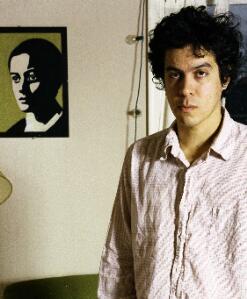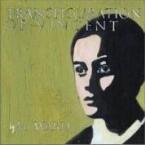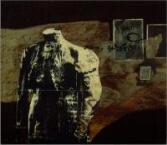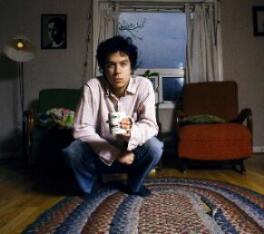Room to Dream: An Interview With M. Ward
by Dave heaton
 M. Ward's third album Transfiguration of Vincent is a vivid channeling of music of the past--old-time country, jazz, folk, bluegrass and blues--that also has a very now sort of presence that carries serious weight and impact. Add to that a rich, dreamlike atmosphere and you have music that transports you to imagined and real pasts, presents and futures at the same time. His singing (uniquely bluesy and delicate) and guitar playing (nimble, soulful) are both ghostly and rooted firmly in American traditions. In the past year Ward not only released an superb album that capitalized on the promise of its equally rewarding predecessors, he's been part of a hard-to-believe number of amazing tours, starting last fall with his spot on the Bright Eyes "orchestra" tour (the one where that band had a stage-filling number of members). After that he toured with Vic Chesnutt, and then Yo La Tengo. And as the interview below was being conducted over email earlier this summer, he was just starting a tour opening for Rilo Kiley. That pairing turned out to be a remarkable one--with Rilo Kiley playing as his back-up band as well, providing Ward's songs with an extra sense of "alt-rock" power and style. With every recording and tour, M. Ward is showing himself to be a multi-faceted musician who carries his own unique musical personality, one rooted in the past but also in our collective dreams.
M. Ward's third album Transfiguration of Vincent is a vivid channeling of music of the past--old-time country, jazz, folk, bluegrass and blues--that also has a very now sort of presence that carries serious weight and impact. Add to that a rich, dreamlike atmosphere and you have music that transports you to imagined and real pasts, presents and futures at the same time. His singing (uniquely bluesy and delicate) and guitar playing (nimble, soulful) are both ghostly and rooted firmly in American traditions. In the past year Ward not only released an superb album that capitalized on the promise of its equally rewarding predecessors, he's been part of a hard-to-believe number of amazing tours, starting last fall with his spot on the Bright Eyes "orchestra" tour (the one where that band had a stage-filling number of members). After that he toured with Vic Chesnutt, and then Yo La Tengo. And as the interview below was being conducted over email earlier this summer, he was just starting a tour opening for Rilo Kiley. That pairing turned out to be a remarkable one--with Rilo Kiley playing as his back-up band as well, providing Ward's songs with an extra sense of "alt-rock" power and style. With every recording and tour, M. Ward is showing himself to be a multi-faceted musician who carries his own unique musical personality, one rooted in the past but also in our collective dreams.
Are you in Australia still? How have the shows there been? Had you been there before?
I'm actually on the airplane right now, heading back to California... It was my first time here, and the audiences were incredible.
It seems like this year and the end of last you've been touring nearly non-stop. What do you enjoy most about touring? What have been some of the more memorable shows you've played lately?
The best part about touring for me is being able to play guitar with musicians and writers that you love. I've been able to play with some of the best in the world (at least my little world), so I can't complain about being away from home as much as I am, even though sometimes I do. The most memorable time in recent memory was playing a June Carter Cash song with Yo La Tengo in Berlin after June died.
In Future Farmer's bio for your End of Amnesia album it states, "Ward is currently living in Portland, Oregon by way of Seattle, Chicago and Ventura County, California." Between that description and how often you tour, one would get the impression that you don't stay in one place for long. Is that true? Do you fit the image of the wandering musician, always on the road?
No - I'm pretty much a homebody. I can get grumpy if I stay too long away from the Shire. At least I'd like to think it's not true, but lately I don't have too much evidence to support it. Since this record came out it's meant touring practically non-stop and I can feel myself becoming slowly deranged. I'm in musical boot camp at the moment and it is a strange strange place to be. But I can't complain--every tour so far has been beyond words. Playing guitar with folks like Lambchop and Yo La Tengo and Vic Chesnutt & Rilo is a true joy.
 This summer you're touring with Rilo Kiley, with them playing as your backing band. How did that come about?
This summer you're touring with Rilo Kiley, with them playing as your backing band. How did that come about?
We met through Conor Oberst and I sent out the invitation and they r.s.v.p.ed and now here we are. I'm a big fan.
Have they backed you up before or is this going to be an experiment of sorts?
"Experiment of sorts" is the idea.
I love that so many of my favorite bands eventually find their way to Merge Records. How did you end up on Merge?
Um...I guess it was through Gerard Cosloy of Matador. He sent out my second record End of Amnesia as a Christmas present to some of his friends...
Do you think of Transfiguration of Vincent as a concept album? It seems like the themes of loss/death run through so much of the album.
The last two records have been concepts on a personal level. End of Amnesia came about out of an attempt to see what would happen if I combined the songs that I've written about dreams and the ones that I've written about memories. It's pretty artsy-fartsy but I thought I would maybe learn something about how my head works. This new record was inspired by the music that was performed at John Fahey's memorial service and the passing of certain friends. So I scooped up those musical expressions as ideals for what makes a "good song" and a "good record" - mourn-celebrate-laugh-cry-time-loss-love songs - in 3 minutes or less.
In what ways do you see this album as differing from your previous two? Are you aware of a progression among your albums?
I'm aware of decay and fear of change but I guess everyone is - right?
 The first time I heard your music (on End of Amnesia), I was instantly taken with how full of a sound it had, how much it enveloped me. Is that a quality you strive for? If so what do you like about that type of sound?
The first time I heard your music (on End of Amnesia), I was instantly taken with how full of a sound it had, how much it enveloped me. Is that a quality you strive for? If so what do you like about that type of sound?
I'm gonna steal a line from David Lynch when he said he loves films or even titles of films that allows the audience room to dream. I'm not sure if I ever have or will ever be able to achieve that in music but I like the idea enough to hold it up as an ideal.
Who are the Old Joe Clarks, the band that plays with you on Transfiguration of Vincent? What's their story, and how did they end up playing on your album?
The Old Joe Clarks are an amazing band in Portland. The main guy in the band engineered the record in his attic. They have a few records out in the u.s.a. and I recommend all of them to anyone.
To what extent is your music informed by the music of the past? It seems to take in so many "old" styles of music.
I like the idea of self-education in music or language without the help of a university. Maybe I feel like I'm just educating myself, but the deeper I dig into those eras where the greatest music was created the more spoiled I get for those sounds and those sentiments. Musically speaking my head is lost in the past, but I'm sure I'll grow out of it someday and get up-to-date on more crucial musical expressions like Coldplay seven-inches or something.
I've read a few concert/album reviews of you where the writer expected you to be an old man, based on your music. How aware are you of your music/songs/singing voice sounding "old"? To what degree do you try to disorient your listeners by making the music sound both old and new?
Any blurring of time and space that occurs within the listener is entirely coincidental and not intended to operate as such...
 Nearly every writer relates your guitar style to that of John Fahey. I can see why, but wonder how much of a role his music truly played in your approach to guitar?
Nearly every writer relates your guitar style to that of John Fahey. I can see why, but wonder how much of a role his music truly played in your approach to guitar?
To me, John Fahey is just as important as Django Reinhardt, Chuck Berry and Chet Atkins to the instrument - it's his guitar style, his production technique, his album artwork, his writing. I'm confident the world will come around someday and recognize him; in the meantime I'm happy talking about him to journalists when I travel around and love the opportunity to steer more folks in that direction.
Your cover of David Bowie's "Let's Dance" is great; it's interesting how you can take a slick 80s pop song and make it sound like something from a long time ago. What lead you to cover that particular song?
It's my favorite Bowie song and I wanted to try out a different production style as an experiment. I played it live a few times and people said "hey this is sort of nice" so it seemed a good way of ending this new record, especially theme-wise.
One last question. I love "Sad, Sad Song"; for some reason it leads me to think about how so many of my favorite songs are heartbreakingly sad. For you what is the appeal of the sad song? Why do sad songs affect people so much more than happy ones?
I'm not sure. Well, I'm not convinced that sad songs affect people more than happy ones--any trip to any dance hall would prove that in my opinion. I think that the sad songs are just as important as the happy ones. As a listener I couldn't bear one or the other, so as a writer I guess it's the same dynamic.
Copyright (c) 2005 erasing clouds |
|